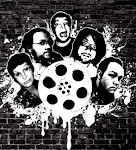Director: Lars von Trier
Writer: Lars von Trier
Starring: Willem Dafoe, Charlotte Gainsbourg
2009 | Denmark | Unrated | 106 mins
★★★★★Prologue
"For I have sworn thee fair and thought thee bright/ Who art as black as hell, as dark as night" Shakespeare ended his Sonnet 147 with these words, a sonnet about the grief, pain, and despair that goes along with any love lost. These are heavy, hurtful, emotional, and devastating stages to go through and these are exactly what you will also go through when you witness Lars von Trier's Antichrist. A film that garnered an anti-award at the 2009 Cannes film festival because it caused such an uproar for is perceived mysogynistic views. Critics have denounced it while others have hailed it, audience members have fainted during screenings, and even yelled out "Fuck you!" to the screen at the end of showings. This is a film polarizing audiences and challenging filmgoers around the world. True art divides people, makes them question and think, and Dannish filmmaker Lars von Trier is not affraid to take you to the darkest places and leave you there.
Chapter One: Grief
Antichrist is the descent of He (Willem Dafoe) and She (Charlotte Gainsbourg) who have lost their son after he fell out of a window, plunging to his death, while they were consumed by their passion. With loss comes depression and grieving and He, being a therapist, wants to cure Her by finding the root of her fears and getting her off the doctor's prescribed medication. Afraid of the woods known as Eden, where She and her son were staying prior while she worked, the couple travels there to try to unravel the pain and piece together their shattered relationship. But nature has other plans.
Chapter Two: Pain (Chaos Reigns)
Von Trier's Antichrist takes the viewer into a world of such raw power, emotion, and human evils with no promises of anything safe or subdued, it just bludgeons you scene after scene. You will be shocked, you will be shaken, and you will be disturbed. But most important of all, Antichrist will make you think and reflect. Walking out of the theatre I had so many questions given to me that the fallout from the haunting effects of the film stayed with me for days after, bringing to light subtleties that point out who really was hurting who: was it He or She? Or it will draw you darker into the numerous tangents the different metaphors the film possesses: is it about theology? Misogyny? The evil of man or nature? Or is there nothing to it all? Whichever conclusion you come to depends on what you got out of the film but ultimately what you brought going in. Antichrist is one of the most reflective pieces of cinema to come out in many of year and I believe to be the most important film of the past decade. It takes you to Hell, the one you've made for yourself.
Chapter Three: Despair (Gynocide)
Some have labelled the film misogynistic, but I can't see a film that is deliberately about the effects of misogyny to be remotely misogynistic. Von Trier even had a researcher specifically on the subject of misogyny while working on the film, as he also had researchers for therapy, theology, and horror. The film does contain scenes of explicit sexual violence, but this reinforces the intentions of the story and the meanings of the fear of loss and the history of He and She. These are not used to be shocking, they are organic to structure of the film and its tone. Both performances by Charlotte Gainsbourg and Willem Dafoe are harrowing and powerful, and the depths that these actors went to in order to bring the real grief, pain, and despair to the screen is unprecedented in film history. And to what degree is the other the one causing the harm? She has become mad and is letting her fear and belief in her gynocide research get to her, but He is using therapy to heal her when she needs her husband to be there for her. Each is dividing the other after their loss. Neither can deal with the grief, pain, and despair.
Chapter Four: The Three Beggars
Theology. Misogyny. Nature. There is no finite answer to what Antichrist is fully about or where it wants you to go looking for its meanings, messages, and/or morals. Lars von Trier has unleashed a beast of cinematic brilliance that expertly makes the audience react to avenues they didn't want to explore. Because of this, you will either love it or hate it, you'll get it or think it's tripe. But even if you think you know what it's about, more questions will arrive long after you've viewed it bringing you to think more about it's effects and you will end up looking for the answers within yourself. Within your own purest Hell.
Epilogue
Von Trier has crafted a film of such haunting emotions and the fear that we each possess individually and transpire with others that Antichrist is a film of devastating beauty. It demands to be seen more than once, and because it is such a polarizing film, it will be discussed, debated, hailed and shunned, as an astounding work of cinematic art for years to come. Even after a second viewing I was actually left with more questions than answers and that's why it's so important - it challenges the viewer - and that is the purpose of art.
All contents copyright 2010 Tyler Baptist





No comments:
Post a Comment